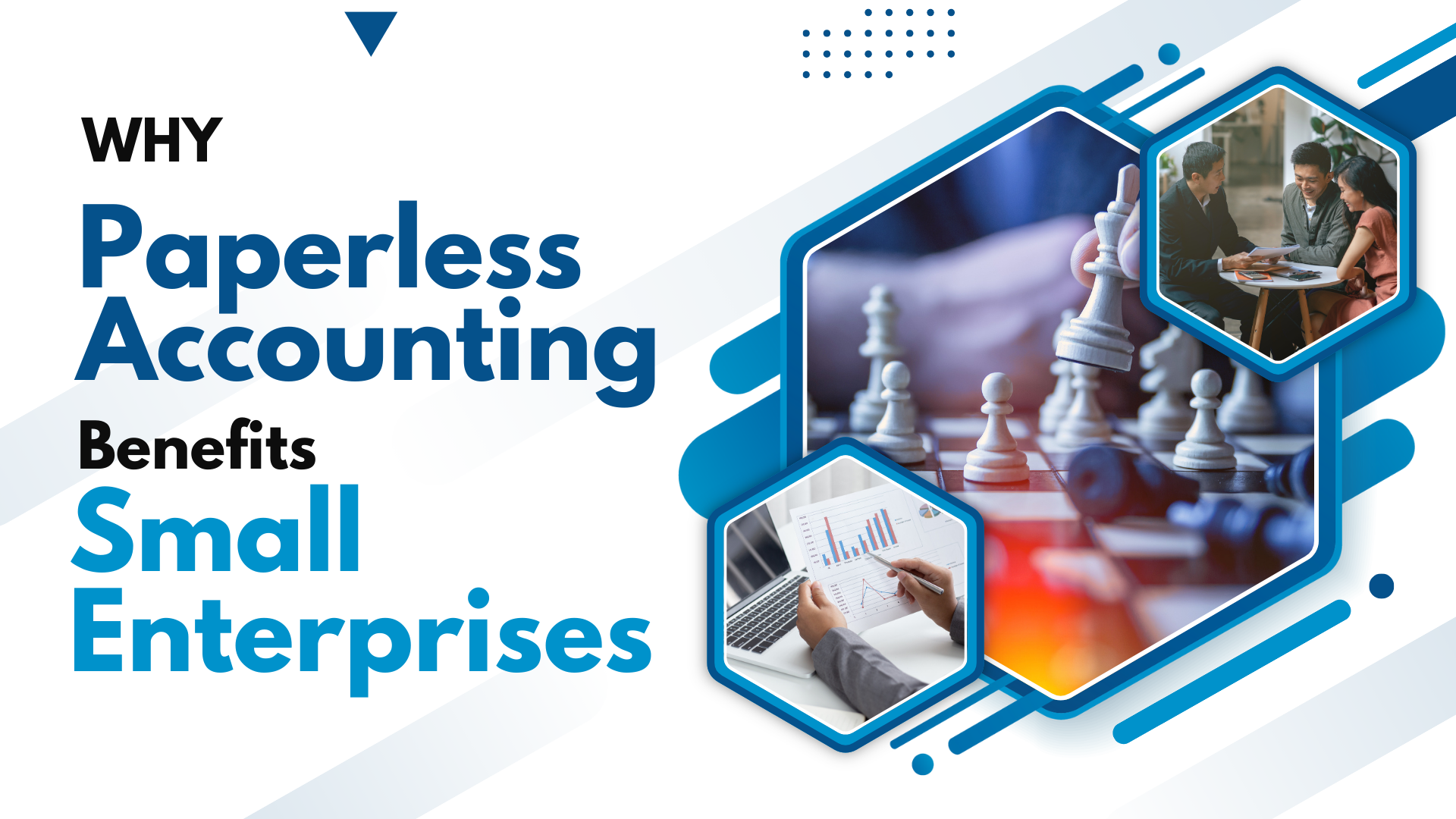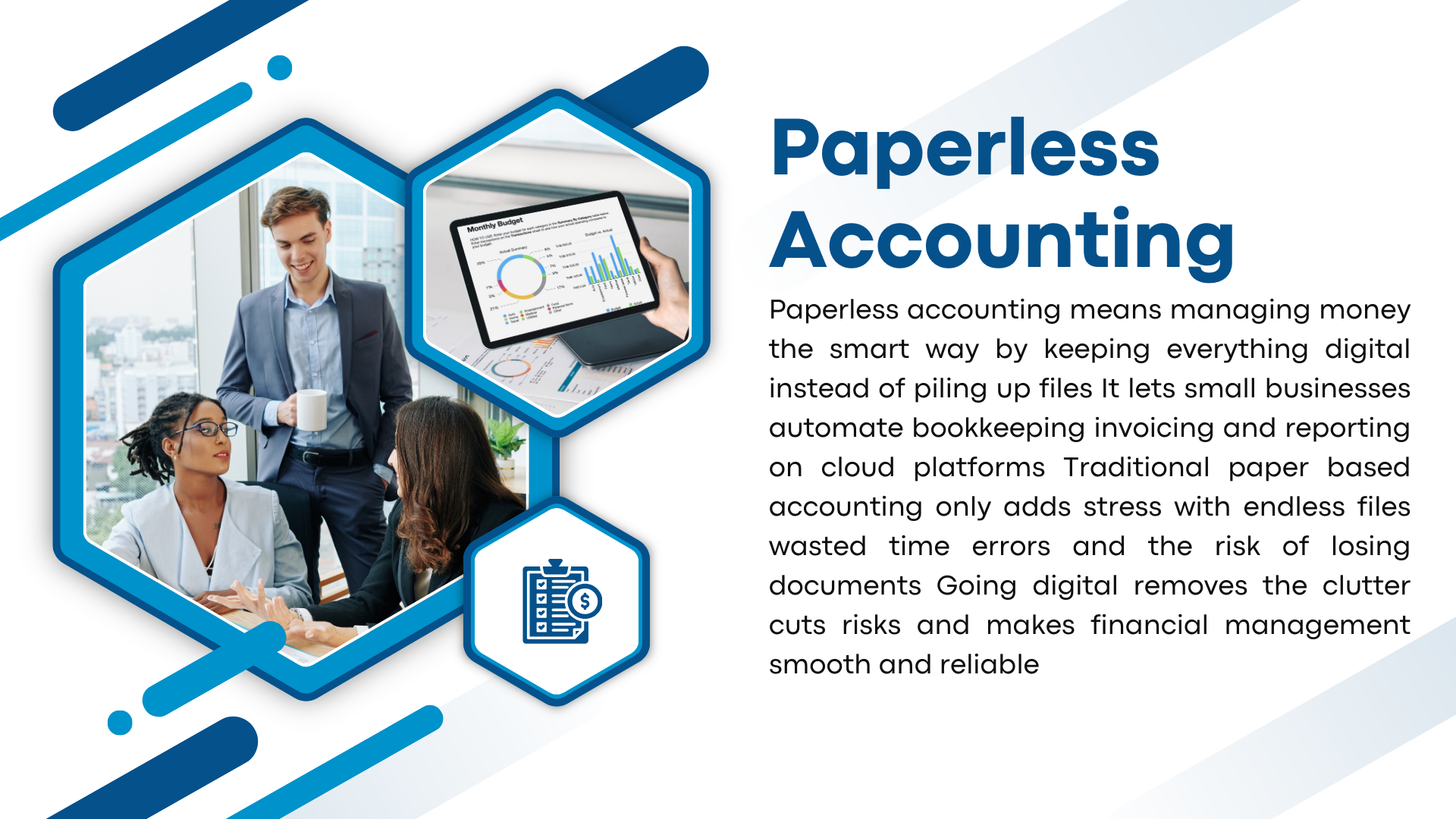Why Paperless Accounting Benefits Small Enterprises

Key Takeaways
-
Digital systems cut costs and manual errors.
-
Real-time insights improve decision-making.
-
Automated processes streamline finances.
-
Seamless document management saves time.
-
Financial tool integration enhances efficiency.
-
Structured transition ensures smooth adoption.
-
Reducing paper supports sustainability.
Paperless accounting is all about managing money matters more smartly by keeping everything digital instead of piling up physical files. It gives small businesses the power to automate bookkeeping invoicing and reporting on cloud based platforms. There is no need to depend on stacks of paper when everything can be accessed with just a few clicks
On the other hand traditional paper based accounting only makes life harder for small businesses finding storing and organizing those endless files takes up time and energy and when things are done by hand mistakes slip in more easily not to mention the stress of losing or damaging important documents which turns audits and compliance into a complete headache
By going digital small businesses cut out the clutter and save themselves from unnecessary risks while making their financial management smooth, reliable, and stress-free.
Digital accounting has many benefits. Business organizations can save a lot of money they would otherwise use in printing, storage, and administration. Automated systems ensure accuracy with less manual effort and greater efficiency.
Furthermore, digital solutions are sustainable as they minimize paper wastage, thus making these businesses green. Paperless accounting will help small businesses get their financial management in order, secure them, and finally facilitate their longevity.
Cost Savings and Financial Efficiency

Indeed, by embracing paperless accounting so small businesses would like to minimize overhead expenses, enhance financial accuracy, and generally improve operational efficiency.
Cutting Down Expenses
Paper-based accounting incurs continuous expenses on printing, storing, and managing documents. Keeping physical records requires space in offices, filing cabinets, and administrative control, adding further to operational costs. Moreover, in America alone, more than 8 billion dollars are wasted on paperwork from businesses, an average of 20 dollars as the cost of filing just a single document. This saves a lot of cost, even previously saving the process of organizing the workflow for business operations.
Reducing Manual Errors and Administrative Burdens
In this instance, entering data manually takes a lot of time, with a very high possibility that poor data entry would lead to a financial error. Activities like invoicing, expense report tracking, and financial reporting are now possible through paperless accounting.
Hence, no manual intervention is present at these activities, which saves a lot of time and also saves a lot of money, which may have been incurred in costly errors caused due to human intervention, thus affecting the financial health of the company.
Adequate Access and Collaboration
Cloud-based accounting gives authorized personnel the ability to access financial data from any location, resulting in flexible collaboration abilities for team members. Such access to data, while not physically located in office premises, helps to enhance collaborative work under modern work environments and orders needed to improve overall productivity.
Enhanced Data Security and Compliance
Small businesses can now enjoy the advantages of digital accounting technologies that provide more security in storing and managing their financial data over conventional paper sources. Going paperless in accounting gives them better protection over sensitive financial records while allowing compliance with regulatory standards.
Loss or Theft of Physical Documents
Physical records are not safe; they could be destroyed in a fire, washed away in a flood, lost, or stolen. Loss of important financial documents could cause interruptions in operations, problems in filing taxes, and may lead to legal issues. All this increases the chances of access to unauthorized paper records, increasing financial fraud.
Regulatory Compliance and Audit Ready
All these financial regulations must be adhered to by small businesses, including tax law regulations and all other data protection policies. Paper-based accounting may lead to a lot of time wastage in searching for specific documents during audits, inviting higher chances of non-compliance to be tossed around.
All financial transactions will be recorded in organized, timestamped logs through an entirely straightforward digital accounting system that can be used for efficient and relatively simple audits.
Data Integrity and Fraud Prevention
Manual financial records have a lot of chances for human error and the tampering of documents. Digital systems keep track of each transaction, providing a clear audit trail. Automation reduces errors at the stage of entry, while built-in fraud detection features are there to pick up inconsistencies. Everything is made sure that finances are reported openly.
Improved Accessibility and Collaboration
Digital Accounting Solutions. In fact, these are the things that have changed how small businesses organize their financial data. The cloud-based accounting software also provides business owners, accountants, and all financial teams with real-time financial data from anywhere they've got an internet connection, outside the submission and retrieval of documents tied to a specific office location.
Real-time access to financial data
Cloud accounting takes things a step further by giving real time updates every time a new entry is made whether it is a financial transaction, a cash flow or an invoice. Decision makers always see the latest numbers right away which means no waiting around for outdated reports
For small businesses this is a game changer it makes it so much easier to keep track of expenses follow income closely and pull out reports whenever needed. The result is clearer financial visibility and smarter budgeting without the delays that come with traditional methods
Seamless Collaboration with Remote Teams
For those businesses that are part of a complete or partial remote hybrid team, cloud accounting allows many users to interface with financial records at the same time. Accountants and bookkeepers will be able to make ledger entries, reconcile transactions, and share insights at the same time. This will make everything easy communication-wise and at the same time keep the financial data precise and uniform across various departments.
Effective Financial Reporting And Auditing
And all of the records will be in the same place, all digital. Financial report management becomes easier when all information is captured in the cloud because cloud platforms allow automated data entry and simple error detection.
Having those invoices, receipts, and statements could be retrieved quickly, particularly when it comes to filing taxes and audits, and checks on compliance, because all the necessary documentation can be provided right away.
Faster and More Accurate Financial Reporting
Accurate and timely financial reporting also guarantees that small businesses remain financially viable and make good decisions. Paperless accounts are based on automation and digitization features that make data entry and reconciliation less manual and therefore very accurate in reporting.
Minimizing Human Error Through Automation
Manual input dominates traditional accounting tasks, making them subject to errors in calculation, classification, and recording of data. Automated accounting systems eliminate such risks by:
-
Auto-populating financial entries from related transactions.
-
Real-time identification of discrepancies in the bookkeeping.
-
Applying uniform formulas and rules for accuracy in financial reporting.
True Financial Relevance for Better Decision-Making
Timely access to financial information is central to prompt decision-making in business. Paperless accounting offers:
-
Instant access to cash flow, revenue, and expense reports without waiting for manual entry.
-
Visualization of data through dashboards and charts to better present financial analyses.
-
Faster month-end and year-end close processes, so reports are delivered on time for audits and tax filings.
Seamless Integration with Other Financial Tools
Digital accounting platforms integrate seamlessly with banking solutions, payroll software, and tax management applications to ensure:
-
Automatic synchronization of financial transactions.
-
Consistency across all financial records to eliminate duplication.
-
One view of the business performance for accurate forecasting and planning.
Paperless accounting will provide small enterprises with greater accuracy, reduced delays in reporting, and data-backed decision-making empowered with confidence.
Seamless Document Management
Small businesses must have efficient document management to ensure they maintain accurate financial records. Digital tools made that easy, allowing businesses to store, find, and share documents without the hassles of using actual paperwork. Invoicing, receipts, and financial statements can be accessed from cloud accounting systems that enable record-keeping in an organized and easily accessible manner.
Quick Store and Retrieval
There's no paper filing to need space for physical sorting; digital storage comes structured and organized with tags and categories searchable for quick retrieval. Financial records pulled up through these methods would save the business time spent on document management.
Effortless Transformation and Organizing Documents
An easy way to make financial records accessible and well-kept is to digitize them; invoices and receipts could be turned easily into online formats using a Word to PDF converter to ensure that records are organized and searchable. Doing this helps the business maintain a clear audit trail while saving time on the retrieval of documents.
Automatic Backup and Data Protection
Secured against loss, fire, or misplacement, paper records are automatically backed up and encrypted under digital accounting solutions. Financial data remains intact by acquiring an automatic backup and encryption against system failures or cyber threats.
Steps to Transition to Paperless Accounting
Moving over to paperless accounting is not something that can be accomplished overnight. This transition must be implemented in a structured manner so the regular business will not be interrupted. These tips may help small businesses do well in going paperless.
1. Understand Current Accounting Processes
As a way of accommodating the proposed change, the company must put its accounting procedures in order. Determine what areas are still using paper invoices, receipts, or records about payroll and tax documents. Understanding these points can help to realize which digital solutions can serve the company better.
2. Choosing the Right Accounting Software
The selection of the right accounting software is critical for the conversion to a digital way of managing finances. Choose accounting software that has all cloud storage features, automated invoicing, expense tracking, and bank integration. It would help if you were additionally assured that this package conforms to financial regulations and guarantees data protection.
3. Cloud Storage
With cloud storage small businesses can back up financial records securely while also enjoying the freedom to access them from anywhere. The key is choosing a reliable service that offers encryption and multi factor authentication so sensitive financial data stays safe and protected
4. Automate the Financial System
Automation minimizes the chances of human errors while increasing speed and productivity. The business could interface recurring tasks, from generating client invoices to sending payment reminders, payroll processing, and tax calculations. This further reduces the amount of work for administration while at the same time improving accuracy.
Ending Note

To cut costs, increase efficiency, improve financial accuracy, facilitate data security and compliance, and give scope for cash audits, small enterprises should adopt paperless accounting. Using digital tools gives companies the chance to optimize the management of their financial systems, automate routine work, and enjoy real-time collaboration.
It equally promotes sustainable development in this regard by minimizing paper wastage. If the implementation is structured, secured cloud storage is put into place, and processes are continuously improved, then a small enterprise will have efficient and resilient accounting systems that will ensure its sustenance in the digital economy for years to come.
- Art
- Causes
- Crafts
- Dance
- Drinks
- Film
- Fitness
- Food
- Παιχνίδια
- Gardening
- Health
- Κεντρική Σελίδα
- Literature
- Music
- Networking
- άλλο
- Party
- Religion
- Shopping
- Sports
- Theater
- Wellness


